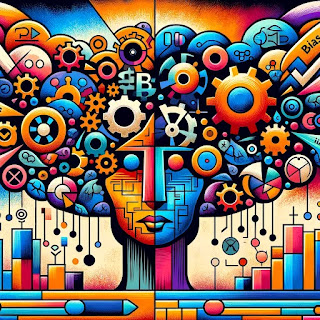Over the past month, I had the privilege of diving into the pages of "May Contain Lies: How Stories, Statistics, and Studies Exploit Our Biases—And What We Can Do about It," written by Professor Alex Edmans. I must admit that this book is a 10 from start to finish. Professor Edmans tackles very contemporary issues in an era where misinformation and extremes dominate the discussion. Finding unbiased and constructive arguments that go beyond confrontation and the minimization of opposing thoughts is challenging. In times when black-and-white thinking is becoming a trend, this book shines as a beacon of light.
The author exposes how societal ailments include ego, groupthink, fear of criticism and error, and a lack of effective inclusion. These manifest in all areas: political, business, and social. Regardless of educational level, social status, or cultural experiences, we are all vulnerable to forming biases and being dominated by emotional thinking systems that divide us and restrict our growth and interconnection. The book uses case studies to show how we can form biases, aiming to recognize our vulnerability to misinformation and lies. Additionally, he provides guidelines on how to avoid falling into manipulation, both as victims and perpetrators, thereby awakening our consciousness and making us consider how we can help reduce these biases and harmful dynamics.
From an academic standpoint, Professor Edmans introduces statistical tools and methodologies that are typically used to avoid premature generalizations. However, he does so in a way that is accessible to all, even those who are not well-versed in statistics or mathematics. His clear and logical structure, emphasizing the distinction between statements, facts, data, evidence, and proof, ensures that his insights are not lost in a sea of technical jargon, making his book a valuable resource for all readers.
In my experience, observing social networks like X or in meetings with some financial industry professionals in Colombia, I have seen that many people operate under what Daniel Kahneman calls system 1, which is driven by emotions. In this system, we think quickly, have prejudices, and seek information that confirms our preconceptions. However, system 1 is also fed by closed, risk-averse, and insular corporate climates.
The punishment of different thinking fosters groupthink and uncritical acceptance of dominant ideas with a louder voice, influenced by fear, ambition, ego, and anger.
Edmans's main objective in his book is to enlighten us on how not to participate in these dynamics. He promotes critical and rational thinking based on logic, inclusion, and balancing counterarguments. He urges us to argue from reason, not emotions, providing contexts and refining rules about problems in our society and organizational culture.
I want to highlight some of the author's insights and recommendations that I believe we should put into action as a society, regardless of our position:
- Remember to pay attention to the granularity and refinement in our assessments.
- Resist the temptation to ridicule opposing thoughts.
- Shift the focus from only seeing problems and obstacles around us to seeing solutions.
No matter how many opinions, theories, or decisions we hold, if they are partially subjective, there is no problem as long as we are honest about them and do not induce error or create monsters of misinformation.
In conclusion, "May Contain Lies" is essential for those seeking to understand and combat misinformation. Professor Edmans provides valuable tools to improve critical thinking and contribute to a more informed and rational society. Its pages are a guide to navigating these times of uncertainty and misinformation.


0 Comments
Post a Comment